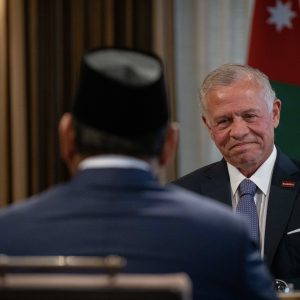War in Yemen is ‘model’ for success or failure of UNSC: Expert
ISTANBUL – The United Nations Security Council (UNSC) has welcomed the announcement of the peaceful transfer of power of the legitimate Yemeni government by President Abd-Rabbu Mansour Hadi to the Presidential Leadership Council.
In a press release, the UNSC expressed hope that this would constitute an important step towards stability and a comprehensive Yemeni-led political settlement under the auspices of the UN after the start of the truce on April 2.
Ali al-Dahab, a Yemeni researcher and military affairs analyst, assessed the UNSC resolutions on Yemen during the last few years and their effectiveness in bringing peace to the country.
Seven years ago, in resolution 2216 (2015), the UNSC reiterated its support for the efforts of the Gulf Cooperation Council (GCC) in assisting the political transition in Yemen and commended its engagement in this regard.
Al-Dahab praised the resolution, saying the UNSC was “not mistaken” to make such a decision as the situation in Yemen in 2014 was “threatening regional and international peace and security.”
He noted that the resolution included sanctions against the Houthi rebels, an arms embargo, and called on all Yemeni parties to start a peace process, all of which were in the interest of stabilizing security in Yemen, the region, and the world.
Since 2011, the UNSC has issued many resolutions on Yemen, including resolutions 2014 (2011), 2051 (2012), 2140 (2014), 2201 (2015), 2204 (2015), 2216 (2015), and 2624 (2022).
Resolution 2216 condemned “any attempt by the Houthis to take actions that are exclusively within the authority of the legitimate Government of Yemen, and noting that such actions are unacceptable.”
However, al-Dahab said the resolution was “not very effective” in preventing arms smuggling, given the improving ability of the Houthis to develop weapons since its issuance.
“The resolution has only an honorable impact of endorsing the legitimate government and supporting the regional intervention in Yemen,” he said.
In September 2014, Houthi forces captured the capital Sanaa, and in January 2015, they attempted to unilaterally replace the legitimate government of Yemen with an illegitimate governing authority that the Houthis dominated.
In order to reinstate the Yemeni government, the Saudi-led coalition started a vast military operation in Yemen named “Operation Decisive Storm.”
At the beginning, the operation represented a “source of hope for those who rejected the Houthis’ coup, Mutahhar al-Sufari, a Yemeni researcher said.
“In its first few months, the operation was able to recapture many areas from Houthis rebels, most notably the interim capital Aden,” he said.
Al-Sufari believes that the intervention of the Arab coalition led by Saudi Arabia succeeded in preserving the international support of the legitimate government and stopped the country from falling into the hands of militias.
But he also argues that many problems arose quickly as the main actors in the coalition started to interfere with the government’s work.
“The Saudis and the UAE started establishing and supporting armed groups that are not under the authority of the internationally recognized government, such as the UAE-backed Giants Brigades and the separatist Southern Transitional Council (STC),” he said.
“Weakening the government in the liberated areas and keeping President Abd-Rabbu Mansour Hadi in exile in Riyadh for the last 10 years are the main mistakes of the Saudi-led coalition in Yemen.”
The United Nations says the military conflict has caused one of the world’s worst man-made humanitarian crises, with 24.1 million people, or 80% of the population, requiring humanitarian assistance and protection. More than 13 million people are in danger of starvation, according to UN estimates.
Both al-Dahab and al-Sufari agreed that there is a “need for some changes” in the structure and work mechanism of the UNSC.
Al-Dahab said even if it seems difficult to make some changes in the UNSC, it is “still possible with the emergence of a group of international powers to impose changes in the future.”
“The Security Council resolutions are subject to interests, not principles,” he said.
He said talking about international peace and security is limited to the national and strategic interests of major members of the UNSC and to the extent of their willingness in dealing with hotbeds of tension in the world.
“We noticed the different responses of the Security Council to Ukraine and Yemen, which came according to the extent of the threat to the security of Europe and the West,” he said.
Al-Sufari sees the war in Yemen as a “model” for the success or failure of the UNSC.
“If the UNSC succeeds in Yemen, this will contribute to restoring the societies’ trust in the UN institutions, and in the case of failure, armed groups around the world will get encouraged to use violence to achieve their political ambitions,” he said.
As mentioned in Resolution 2140 (2014), al-Sufari said the Security Council should stress again that the best solution to the situation in Yemen is through a “peaceful, inclusive, orderly and Yemeni-led political transition process” that meets the legitimate demands and aspirations of the Yemeni people for peaceful change and meaningful political, economic and social reform











